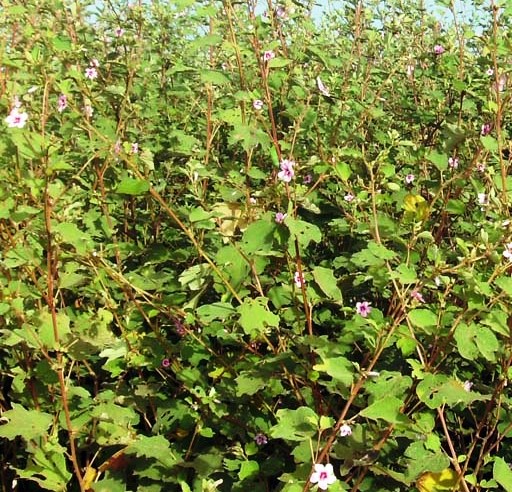Urena lobata

|
|
Urena lobata Common Names: Congo Jute, Caesarweed, Bur Mallow,
Aramina Fiber, Hibiscus Burr Scientific
Classification Kingdom: Plantae Clade: Tracheophytes Clade: Angiosperms Order: Malvales Family: Malvaceae Genus: Urena Species: U. lobata Binomial Name: Urena lobata L. Synonyms: Urena grandiflora DC., Urena trilobata Vell., Urena americana L.f., Urena sinuata L. Morphological Description Urena lobata,
known as Caesarweed or Congo Jute, is a variable erect subshrub or shrub,
typically 0.5–3 m tall, occasionally reaching 4.5 m in cultivation. It is
characterized by: · Stems: Woody at the base, covered with stellate (star-like) hairs,
often purple-tinged, branching extensively · Leaves: Greyish-green, ovate to lobed (3–7 lobes), 4–10 cm long, 3–8
cm wide, with serrated margins and soft, short hairs on both surfaces · Flowers: Small (1–2 cm across), pink-violet, hibiscus-like, solitary
or in clusters, blooming year-round in tropics · Fruit: Dry, dehiscent capsules (schizocarps), 8–10 mm in diameter,
splitting into 5 mericarps, each with hooked bristles Its bristly fruits aid
dispersal by adhering to animals and clothing (Orwa et al., 2009). Distribution and Habitat Urena lobata is
pantropical, likely originating from Africa or Asia, now widespread across
tropical and subtropical regions, including Africa, Asia, Australia, and the
Americas. It thrives in: · Habitats: Forests, grasslands, disturbed areas (e.g., roadsides,
pastures, plantations), and coastal zones · Climate: Hot, humid tropics, with rainfall of 1,000–2,000 mm
annually, temperatures of 20–35°C · Soil Conditions: Well-drained sandy or loamy soils (pH
5.0–7.0), tolerates moderate salinity and salt spray · Elevation: Sea level to 1,600 m Ethnopharmacology Urena lobata,
commonly known as Caesar weed or Congo jute, is a widely used medicinal plant
in tropical and subtropical regions, valued for its broad range of therapeutic
applications in traditional medicine. Different parts of the plant particularly
the leaves, roots, and stems are used for their anti-inflammatory, analgesic,
antimicrobial, antioxidant, and antidiabetic properties. Traditionally, it is
employed to treat fevers, rheumatism, wounds, respiratory issues, diarrhea, and
urinary tract infections. In some cultures, it is also used to manage
reproductive health issues, including as a uterine tonic. Phytochemical studies
have revealed the presence of flavonoids, saponins, alkaloids, tannins, and
phenolic compounds, which are believed to contribute to its healing effects.
While its traditional uses are well-documented, further scientific research is
necessary to confirm its pharmacological efficacy and establish standardized
medicinal applications. · Gastrointestinal Issues: Leaf/root juice treats diarrhea and dysentery
in Bangladesh, with methanol extracts reducing castor oil-induced diarrhea in
rats (Islam et al., 2017). · Antipyretic/Antimalarial: Leaf decoctions lower fever and treat
malaria in Nigeria, linked to flavonoids like quercetin (Adewale et al., 2007). · Reproductive Health: Root infusions aid childbirth in India;
old plant decoctions with eggs induce abortion in Ghana, showing uterine
stimulation in rats (Dhanapal et al., 2012). · Skin Conditions: Leaf poultices heal wounds and sores in
Cameroon, with antibacterial activity against *Staphylococcus aureus* (zone of
inhibition 8–21 mm) (Islam et al., 2017). · Anti-inflammatory: Leaf extracts reduce paw edema in rats
(ED₅₀ 200 mg/kg), used for rheumatism and lumbago in Indonesia (Babu et al.,
2016). · Neuropharmacological: Ethanolic leaf extracts exhibit anxiolytic
effects in mice, used traditionally in Brazil for stress (Islam et al., 2014). ⚠ Toxicity Profile: No significant toxicity reported. However, its
abortifacient use suggests potent bioactivity; high doses may cause uterine or
gastrointestinal irritation. Use under supervision is advised. Phytochemistry The plant’s medicinal
properties are driven by a rich phytochemical profile: · Flavonoids: Quercetin, kaempferol, tiliroside, with antioxidant and
anti-inflammatory effects · Terpenoids: Clematoside-S (triterpenoid saponin), showing anti-yeast
activity (Gao et al., 2015) · Glycosides: Kaempferol glycosides, linked to antimicrobial properties · Fatty Acids: Linoleic, palmitic, oleic acids in seeds, supporting
nutrition · Phenolics: Contribute to wound healing and fever reduction These compounds,
identified via LC-MS, underpin its therapeutic versatility (Islam et al., 2017). Additional Uses · Edible Uses: Young leaves (3.2% protein, 12.8% carbs) cooked as a
vegetable in Malawi; seeds (7–18% oil) used in soups (Facciola, 1998) · Environmental Uses: Stabilizes soil in eroded areas and
controls erosion in Nigeria · Industrial Uses: Bast fiber for ropes, twine, and burlap;
historically a commercial crop in DR Congo (Orwa et al., 2009) · Fodder: Leaves (15.3% crude protein) fed to livestock in southern
Nigeria References
External Links More Pictures |
|
| Compounds of Urena lobata |
|
| References |